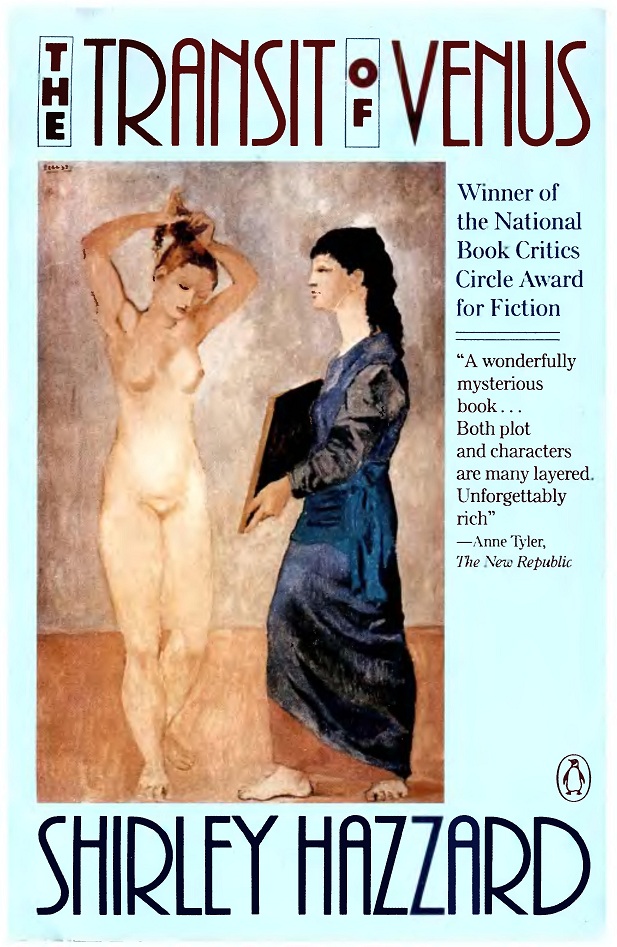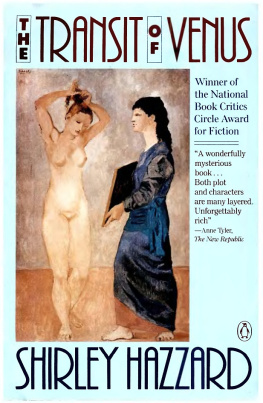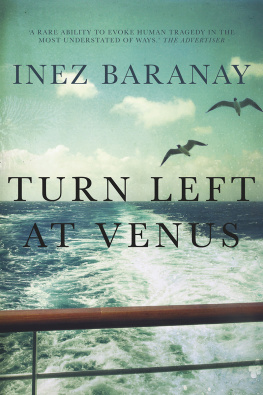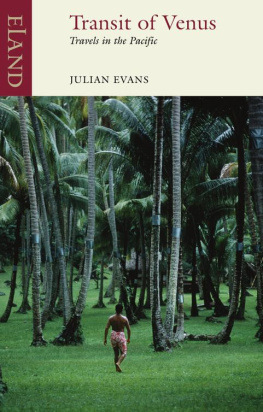
THE TRANSIT OF VENUS
Shirley Hazzard
First published in the United States of America by The Viking Press, 1980 Published in Penguin Books 1990
Copyright Shirley Hazzard, 1980 All rights reserved
The author wishes to thank the John Simon Guggenheim Memorial Foundation, and its president, Mr. Gordon Ray, for the generous award of a fellowship in connection with this work.
A portion of this book originally appeared in The New Yorker .
ACKNOWLEDGMENTS
Editions Gallimard: "Le Dernier Pome" from Domaine Public by Robert Desnos.
A. J. Gurr: From The Maid's Tragedy by Beaumont and Fletcher.
Macmillan Publishing Co. , Inc. , and A. P. Watt Ltd. : From "Meditations in Time of Civil War." Copyright 1928 by Macmillan Publishing Co., Inc., renewed 1956 by Georgie Yeats. From "Politics." Copyright 1940 by Georgie Yeats, renewed 1968 by Bertha Georgie Yeats, Michael Butler Yeats, and Anne Yeats. Both poems from Collected Poems by William Butler Yeats.
Macmillan Publishing Co. , Inc. : "At Castle Boterel" from Collected Poems by Thomas Hardy (New York: Macmillan, 1953).
New Directions Publishing Corp.: From "Verso Sueltos" and "The Shuffled Deck," Poems and Anti-Poems by Nicanor Parra, translated by Miller Williams. Copyright 1967 by Nicanor Parra.
LIBRARY OF CONGRESS CATALOGING IN PUBLICATION DATA
Hazzard, Shirley. The transit of Venus/Shirley Hazzard. p. cm. ISBN 0 14 010747 9 I. Title. [PR9619.3.H369T7 1990] 823 dc20 90-6813
Once more,for Francis
The author wishes to thank Professor E. M. Burbidge, who so generously responded to questions, from a neophyte, about astronomy.
J'ai rv tellement fort de toi,
J'ai tellement march, tellement parl,
Tellement aim ton ombre,
Qu'il ne me reste plus rien de toi.
Robert Desnos "Le Dernier Pome"

Part 1 THE OLD WORLD
By nightfall the headlines would be reporting devastation.
It was simply that the sky, on a shadeless day, suddenly lowered itself like an awning. Purple silence petrified the limbs of trees and stood crops upright in the fields like hair on end. Whatever there was of fresh white paint sprang out from downs or dunes, or lacerated a roadside with a streak of fencing. This occurred shortly after midday on a summer Monday in the south of England.
As late as the following morning, small paragraphs would even appear in newspapers having space to fill due to a hiatus in elections, fiendish crimes, and the Korean Warunroofed houses and stripped orchards being given in numbers and acreage; with only lastly, briefly, the mention of a body where a bridge was swept away.
That noon a man was walking slowly into a landscape under a branch of lightning. A frame of almost human expectancy defined this scene, which he entered from the left-hand corner. Every nervefor even barns and wheelbarrows and things without tissue developed nerve in those momentswaited, fatalistic. Only he, kinetic, advanced against circumstances to a single destination.
Farmers moved methodically, leading animals or propelling machines to shelter. Beyond the horizon, provincial streets went frantic at the first drops. Wipers wagged on windshields, and people also charged and dodged to and fro, to and fro. Packages were bunged inside coat-fronts, newspapers upturned on new perms. A dog raced through a cathedral. Children ran in thrilling from playgrounds, windows thudded, doors slammed. Housewives were rushing, and crying out, "My washing." And a sudden stripe of light split earth from sky.
It was then that the walking man arrived at the path, and stood. Above him, four old houses were set wide apart on a high curve of hill: holding down, like placed weights, the billowing land. He had been given their names in the villagethe names, not of masters but of dwellings. Brick walls were threadbare, tawny; one showed a side of ivy, green as an upturned lawn. The farthest and largest house stood forward from a wood, claiming supremacy.
The man observed from a decisive turn of his own stillness, as if on some great clock he saw the hand fall to the next stroke before his eyes. He turned off the road on the first wave of rain and gale, put his suitcase down, took off his soaked cap, beat it on his side, and stuffed it in a pocket. His hair sprang up like the crops between the gusts and, like them, was quickly, wetly flat. He climbed the hill in the rain, steadily and with no air of wretchedness. Once he paused to look back at the valleyor vale, it might be sweetly, tamely called. Peal on peal of thunder swept it, up and down, until the pliant crops themselves reverberated. On an opposing hill there was a castlegrey, tumid, turreted, and not unsuited to the storm.
Approaching the farthest house, he paused again, looking with as much plain interest as if the weather had been fine. Water ran in his collar from his tilted head. The house darkened, but stood firm. Through two or three centuries of minor additions, Peverel had held to scale and congruity like a principle; consistent except for one enlarged high windowan intentional, frivolous defect like the piercing of an ear for an ornament.
Mud was streaming over gravel and beaten clay. Ledges of clipped privet were shaking all over. The man waded up into the entrance of the house as if from the sea, and pulled a bell. Quick footsteps were perhaps his own heartbeats. The woman who opened the door was old, he thought. Had he himself been a few years older, he might have promoted her to middle age. Age was coiled in smooth grey hair, was explicit in skin too delicate for youth and in a tall if unmartial stance. She drew him in over the paving of what had been a fine hall. Her eyes were enlarged and faded with discovering what, by common human agreement, is better undivulged.
How calmly they exchanged names, ignoring the surf at his back and his saturated clothes. The cheap suitcase oozed orange on the black and white floor while Ted Tice took off his raincoat and hung it on a stand, as directed. A smell of wet wool, of socks and sweat was pungently released in the coldly soaped and well-waxed void.
All these slow matters had taken seconds, and in that time it could be seen, too, that the hall was circular, that a bowl of roses stood on a table beside a usual newspaper, beneath a dark picture framed in gold. Under the curve of a stair, a door was open on a corridor of Persian runner. And above, on the arc of stairs, there was a young woman, standing still.
Tice looked up to her. It would have been unnatural not to. He looked up from his wet shoes and his wet smell and his orange blotch of cheap luggage. And she looked down, high and dry. He had an impression of her body in its full dimensionsas if he had passed at her back and seen her strong spine, the black hair parting on the prominent cord of the nape, the fragile crease behind the knee. Her face was in shadow. In any case it would have been too pat, too perfect, if she had been seen to be beautiful.
"I was looking for Tom," she said, and went away.
Ted Tice took up his dissolving suitcase: a new arrival who must keep his counsel among initiates. Who would soon himself look for Tom, or know why others sought him.
"My husband," said Charmian Thrale, "is so much better, and will be down to lunch." Ted Tice was to work with Professor Sefton Thrale, who was so much better, for the months of July and August. In the meantime he was being led by Mrs. Thrale down the Persian carpet, past old photographs and a framed letter with a gold crest, and a series of engravings of the ports of Britain. Now Mrs. Thrale would say, "This is your room," and he would be alone.
Next page










